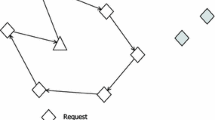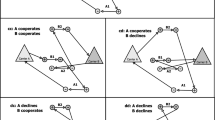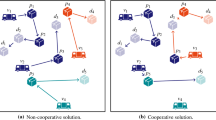Abstract
In the highly competitive shipping and transportation industry, companies need to achieve a maximum level of efficiency in order to stay in business. To reach this goal they can, for instance, participate in collaborative networks and trade their transportation requests among each other. This is commonly done by using auction-based exchange systems. A critical part here is the formation of the request candidate set, which is the bundle of requests that should be offered to other carriers. Therefore, we develop and evaluate different request evaluation strategies for carriers participating in auction-based collaborations. For our investigations, we use a framework that is based on an exchange mechanism presented in the literature. The goal is to maximize the total network profit while enabling the carriers to reveal as little as possible of their private information. We did several adaptions to the existing framework to improve the performance and to make it applicable to larger test cases. For instance, the exact and thus costly tour building method is replaced by a heuristic approach. We achieve comparable results while the runtime is reduced by several orders of magnitude. Thus, we are able to handle problems with an increased number of transportation requests. Different strategies for the evaluation of pickup and delivery requests are assessed based on their effect on the total profit of the collaborative carrier network.




Similar content being viewed by others
References
Ackermann H, Ewe H, Kopfer H, Küfer KH (2011) Combinatorial auctions in freight logistics. In: Böse JW, Hu H, Carlos C, Shi X, Stahlbock R, Voss S (eds) Computational logistics. Lecture notes in computer science, vol 6971. Springer, Berlin, pp 1–17
Berbeglia G, Cordeau JF, Gribkovskaia I, Laporte G (2007) Static pickup and delivery problems: a classification scheme and survey. TOP 15(1):1–31
Berger S, Bierwirth C (2010) Solutions to the request reassignment problem in collaborative carrier networks. Transp Res Part E: Logist Transp Rev 46:627–638
Bloos M, Kopfer H (2011) Vehicle routing and scheduling in carrier networks: two heuristics for collaborative planning. In: Proceedings of the 23rd annual NOFOMA conference
Bolduc M, Renaud J, Boctor F, Laporte G (2008) A perturbation metaheuristic for the vehicle routing problem with private fleet and common carriers. J Oper Res Soc 59:776–787
Buer T (2014) An exact and two heuristic strategies for truthful bidding in combinatorial transport auctions. CoRR. arXiv:1406.1928
Chu CW (2005) A heuristic algorithm for the truckload and less-than-truckload problem. Eur J Oper Res 165(3):657–667
Dahl S, Derigs U (2011) Cooperative planning in express carrier networks an empirical study on the effectiveness of a real-time decision support system. Decis Support Syst 51(3):620–626
Dai B, Chen H (2011) A multi-agent and auction-based framework and approach for carrier collaboration. Logist Res 3(2–3):101–120
de Vries S, Vohra RV (2003) Combinatorial auctions: a survey. INFORMS J Comput 15(3):284–309
Douma A, Schuur P, van der Heijden M (2006) Applying revenue management to agent-based transportation plannings. Beta Working Paper Series, WP-169
Ergun O, Kuyzu G, Savelsbergh M (2007) Reducing truckload transportation costs through collaboration. Transp Sci 41(2):206–221
Figliozzi MA (2006) Analysis and evaluation of incentive-compatible dynamic mechanisms for carrier collaboration. Transp Res Rec J Transp Res Board 1966:34–40
Hernandez S, Peeta S, Kalafatas G (2011) A less-than-truckload carrier collaboration planning problem under dynamic capacities. Transp Res Part E: Logist Transp Rev 47(6):933–946
Krajewska MA, Kopfer H (2006) Collaborating freight forwarding enterprises. OR Spectr 28(3):301–317
Krajewska MA, Kopfer H (2009) Transportation planning in freight forwarding companies: Tabu search algorithm for the integrated operational transportation planning problem. Eur J Oper Res 197(2):741–751
Krajewska MA, Kopfer H, Laporte G, Ropke S, Zaccor G (2008) Horizontal cooperation among freight carriers: request allocation and profit sharing. J Oper Res Soc 59:1483–1491
Kwasnica A, Ledyard J, Porter D, DeMartini C (2005) A new and improved design for multi-object iterative auctions. Manag Sci 51(3):419–434
Lin S (1965) Computer solutions of the traveling salesman problem. Bell Syst Tech J 44:2245–2269
Mes M, van der Heijden M, Schuur P (2010) Look-ahead strategies for dynamic pickup and delivery problems. OR Spectr 32(2):395–421
Nadarajah S, Bookbinder JH (2013) Less-than-truckload carrier collaboration problem: modeling framework and solution approach. J Heuristics 19:917–942
Parragh S, Dörner K, Hartl RF (2008) A survey on pickup and delivery problems. Part II: transportation between pickup and delivery locations. Journal für Betriebswirtschaft 58:21–51
Pekeč A, Rothkopf MH (2003) Combinatorial auction design. Manag Sci 49(11):1485–1503
Puettmann C, Stadtler H (2010) A collaborative planning approach for intermodal freight transportation. OR Spectr 32(3):809–830
Renaud J, Boctor F, Quenniche J (2000) A heuristic for the pickup and delivery traveling salesman problem. Comput Oper Res 27:905–916
Ruijgrok C (2003) European transport: insights and challenges. In: Brewer A, Button K, Hensher D (eds) Handbook of logistics and supply chain management. Elsevier, Amsterdam, pp 29–46
Schwind M, Gujo O, Vykoukal J (2009) A combinatorial intra-enterprise exchange for logistics services. Inf Syst E-Bus Manag 7:447–471
Sheffi Y (2004) Combinatorial auctions in the procurement of transportation services. Interfaces 34(4):245–252
Skjoett-Larsen T (2000) European logistics beyond 2000. J Phys Distrib Logist Manag 30(5):377–387
Triki C, Oprea S, Beraldi P, Crainic TG (2014) The stochastic bid generation problem in combinatorial transportation auctions. Eur J Oper Res 236(3):991–999
Vickrey W (1961) Counterspeculation, auctions, and competitive sealed tenders. J Financ 16(1):8–37
Wang X, Kopfer H (2014) Collaborative transportation planning of less-than-truckload freight. OR Spectr 36:357–380
Acknowledgments
The authors want to thank Susanne Berger and Christian Bierwirth for providing their test instances. Also the support of Daniel Kaml is appreciated.
Author information
Authors and Affiliations
Corresponding author
Rights and permissions
About this article
Cite this article
Gansterer, M., Hartl, R.F. Request evaluation strategies for carriers in auction-based collaborations. OR Spectrum 38, 3–23 (2016). https://doi.org/10.1007/s00291-015-0411-1
Received:
Accepted:
Published:
Issue Date:
DOI: https://doi.org/10.1007/s00291-015-0411-1




